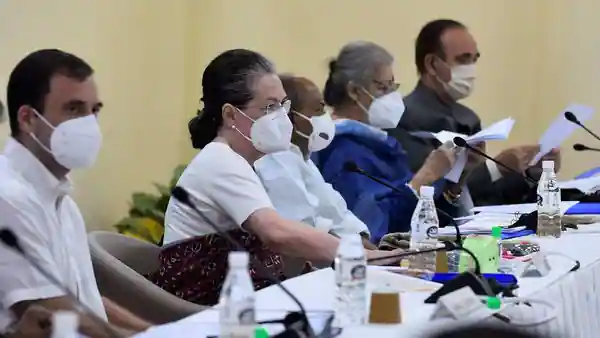Another session of Parliament in the 17th Lok Sabha will end this week, marked by a continuing impasse between the ruling NDA and a large segment of the Opposition, including the Congress. The government on its part made no serious effort to engage with the Opposition and almost gave an impression that it was business as usual sans discussion and debate. The disputatious farm laws were withdrawn as swiftly as they were passed.
However, despite the plethora of issues that came its way, the Opposition was unable to paint the government in a corner, primarily because it failed to regroup into a bulwark of resistance. For a brief moment, the Congress inspired hope when Sonia Gandhi, the party’s interim president, herself initiated a meeting of the Opposition instead of Rahul Gandhi. In the past, Sonia demonstrated her willingness to rise above personal prejudices when it came to raising a wall of dissent against the BJP.
The United Progressive Alliance (UPA) she birthed in 2004 had the NCP and the DMK, constituents with whom the Congress shared a troubled past. The NCP was led by Sharad Pawar who the Congress expelled in 1999 for raising the matter of Sonia’s “foreign” origin and questioning her claim to lead the party on this ground. The DMK was looked upon askance by the Congress and the Gandhis because of its alleged role in providing sanctuary and colluding with the LTTE in the assassination of Rajiv Gandhi in 1991. Indeed, in 1997, when an interim report by Justice Milap Chand Jain, which probed the conspiracy aspect of Gandhi’s killing in Sriperumbudur, had nailed the DMK’s complicity, the Congress pulled out support to the United Front government, of which the DMK was a major constituent. Despite this history, Sonia prioritized political exigency over her own considerations, inducted the NCP and DMK in the UPA and sealed long-term electoral alliances with the parties. She even reached out to the Samajwadi Party after the Left parties withdrew support to the UPA government over the India-US civil nuclear agreement, notwithstanding the fact that the SP’s general secretary Amar Singh, a close confidant of its leader Mulayam Singh Yadav, spoke disparagingly of her.
However, this time when she sought to regroup the Opposition, she did not invite the Trinamool Congress Party (TMC). In making this move, Sonia seems to be dictated by Rahul’s predisposition towards Mamata Banerjee, the TMC president, and not her political instinct. Rahul never took kindly to Mamata, who incidentally his father Rajiv Gandhi regarded as a younger sister and mentored her. Sonia, on her part, was always soft on Mamata who split from the Congress to protest Sitaram Kesri’s stewardship of the party.
In August, during the monsoon session of Parliament, when Sonia hosted an Opposition meeting to which the TMC was invited, Mamata attended. When Rahul called similar meetings, the TMC sent a representative instead of dispatching a senior person. Sonia set aside whatever reservations she might have had over the TMC spiriting away her former Assam MP, Sushmita Dev, just days before the Opposition meet.
If a balance sheet of the Opposition is drawn, at least three crucial regional parties—the Biju Janata Dal, the YSR Congress Party led by YS Jagan Mohan Reddy and the Telangana Rashtra Samithi—have kept away from the Congress. On the contrary, this trio, in pursuit of the “equidistance” policy, warmed up to the BJP although the TRS lately fell out after the rapid strides made by the BJP in Telangana. The Shiromani Akali Dal and the BSP have never associated with the Congress as has the Aam Aadmi Party. None of these parties can be sniffed at.
Can a formation, claiming to “fight” the BJP and its NDA coalition, conceivably exclude chunks of the Opposition? Most of these parties are up against the BJP on their respective turf and not the Congress. The BJD has the BJP as its principal challenger in Odisha, the YSR Congress is wary of its adversary the Telugu Desam Party’s recent exertions to get back into the BJP’s good books while the TRS is losing sleep over the BJP’s Telangana breakthrough.
Who is Mamata fighting in West Bengal? Clearly, the BJP that doubtless ceded ground after a spectacular debut in the Lok Sabha polls. For all the losses it suffered, the BJP has not given up on West Bengal. Mamata knows that. Therefore, for the Congress to accuse the TMC of being a “silent collaborator” of the BJP is to miss the big picture. The Congress’s marginalization in West Bengal—evident in the Lok Sabha and assembly polls’ outcome—will be reinforced by the results of the civic polls.
The Congress’s frustration over losing some of its leaders to the TMC is understandable but can one realistically fault a Sushmita Dev or an Ashok Tanwar to look for an option after hitting the wall on their political terrain as Congress members?
A political commentator once disregarded the notion of Opposition unity as a “lazy idea”. Sonia has reduced her attempt at forging one to mere grandstanding. She has to choose her battles and make up her mind over who is her bigger foe: the BJP or the TMC.












